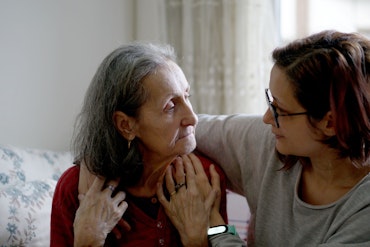New research into better practice aged care released by Royal Commission
New research reports from Flinders University in South Australia, delivered together in partnership with the Royal Commission into Aged Care Quality and Safety, suggests that the Federal Government needs to improve its spend on Australian aged care to improve the industry.
![<p>The reports highlighted that other countries are spending more on long term care for older people, compared to Australia’s current spend, which is around 1.2 percent. [Source: Shutterstock]</p>](https://agedcareguide-assets.imgix.net/news/articles/news/articles/New-research-into-better-practice-aged-care-released-by-Royal-Commission-31_1_2020.jpg?fm=pjpg&format=auto&w=550&q=65)
The reports highlighted that other countries are spending more on long term care for older people, compared to Australia’s current spend, which is around 1.2 percent. [Source: Shutterstock]
The second research report, Review of International Systems of Long-term Care of Older People, suggests that Australian aged care needs to shift focus from an economic focus to a social focus.
While the third research paper, Review of Innovative Models of Aged Care, had a focus on systems that Australia doesn’t use in the aged care sector but could have a positive effect on the industry.
Also highlighted in the studies were areas where Australia scores low in, like coordination between aged care services and health care, and staffing levels in residential institutions.
Flinders University examined 22 countries for the second research paper, pointing to Denmark and Sweden as likely to have good quality long term care systems.
The reports also highlighted that these countries Gross Domestic Product (GDP) spend was 4 percent for long term care for older people, compared to Australia’s current spend, which is around 1.2 percent.
Australia was also one of the countries to spend the lowest amount on long term care even though a high proportion of the aged population, around 45 percent, is living in residential aged care.
Additionally, the staffing levels in residential aged care facilities were at the lower end compared to other countries.
The research did find that Australia had high accessibility to different levels of long term care, but Australia did not score well for coordination quality between long term care and services like health care.
Suggestions to improve the aged care system in Australia include:
Increasing support for home-based care and informal carers
More high level Home Care Packages
Increased involvement of local or regional authorities in the regulation and monitoring of long term care services
Increased professionalism and training of the workforce
Increased transparency in staffing levels
Mandatory reporting and public availability of quality of care indicators
Integration with the healthcare system
Stronger focus on rehabilitation and maintaining function to delay and avoid disability
Incorporation of principles of human rights in the aged care standards.
The third research paper suggested new approaches used in other countries that would work well within Australia. For instance:
Supports for people with dementia living at home and their carers
System navigators to streamline access to care for people with dementia or other serious health conditions
Smaller residential care homes which encourage the independence of residents
Respite services that reflect people’s backgrounds, like a farm setting for people in agricultural areas, which could benefit a person with dementia
More training and accreditation practices to improve services for people with diverse backgrounds
Expanded telehealth communication services to provide better access to health and other care services for people unable to travel or in remote areas
Increased support of independent living ‘health smart homes’ to help elderly people live at home for longer
Both research papers were prepared to inform the Royal Commission and the public. Any views expressed in them are not necessarily the views of the Commissioners.
Peak body for non-profit aged care providers, Aged and Community Services Australia (ACSA) says the reports delivered to the Commission is an “embarrassing wake up call” on the nation’s current funding and support for the aged care sector.
Patricia Sparrow, ACSA Chief Executive Officer (CEO), says, “Australia is at the bottom of the barrel when it comes to GDP spending on aged care. That’s not just embarrassing, it should also be an urgent wake up call for the economy and for people entering retirement who may need aged care within the next twenty years.
“It’s actually incredible, the amazing work that goes on in our aged care sector when it is so desperately in need of greater investment, both from government and the community.
“The harsh reality is that despite Australia being a prosperous nation, we are falling behind because we don’t value older people enough.
“Not only is the aged care sector underfunded compared to other countries, but Australians who make huge sacrifices to care for elderly relatives don’t get the same level of benefits either. There is a fundamental mismatch here, that at its core is an undervaluing of the contribution older people deliver for community and the economy.”
ACSA is calling for action from the Federal Government to support the aged care sector, especially after the recent revelation that 51 percent of aged care facilities are operating at a loss and older Australians are left on the Home Care Package waitlist for long periods.
Ms Sparrow adds, “The good news is that people are starting to realise that rules and regulations can’t improve aged care by themselves. It is now up to Government and the community to work together and pursue the big changes that we hope to see out of the Royal Commission.
“The Royal Commission is receiving evidence about innovative models from overseas that could help us adapt and improve. There are plenty of ideas and solutions out there, many of which Australia’s aged care providers are trying to implement here, but they need effective funding and a supportive regulatory environment to do so.”
To view the reports received by the Royal Commission, click here.
To read the first Research report released in October last year from the Australian Health Services Research Institute at the University of Wollongong, called How Australian residential aged care staffing levels compare with international and national benchmarks, click here.























